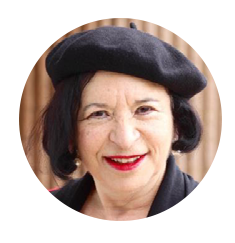Stackable Credentials: A Story of Innovation Emerging from Adversity

by Dr. Carole Bausell
“Stackable Credentials are “part of a sequence of credentials accumulated over time to build up an individual’s qualification to help them move along a career pathway or up a career ladder to potentially different and higher paying jobs.”
Every year Literacy Council of Northern Virginia (LCNV) attends the Virginia Adult Education and Literacy Conference. We learn how others address challenges similar to our own and bring back a slew of creative ideas. We try to share some of our homemade innovations as well.
This year’s conference, Vision for the Future, took place in Harrisonburg in February. Ashley King, Admissions Manager and Registrar, joined me for a terrific institute on blended learning by World Education’s Dr. Jen Vanek. Little did we know that in less than a month’s time, we would need those distance learning strategies to reinvent our entire course catalogue!
My presentation, Stackable Credentials that Propel Beginning English Learners along Career Pathways: Partnership Development that Leads to Innovation, delivered on behalf of co-authors Executive Director Roopal Saran and Manager of Instructional Design Soo Park, described why we developed our own stackable credential as a bridge to an industry-recognized credential. On that Wednesday afternoon, I looked around at the interesting group assembled in my assigned conference room and remembered the many excellent presentations that had shaped my own thinking in the past. I felt like I was standing on the backs of giants.
Stackable credentials are “…part of a sequence of credentials accumulated over time to build up an individual’s qualification to help them move along a career pathway or up a career ladder to potentially different and higher paying jobs,” I began (Naughton, 2018) . Since most of our learners do not have unlimited time to learn English well enough to get a job, providing stepping stones along a career pathway can become a lifeline. Each stepping stone or stackable credential shows potential employers job- relevant skills. Each inspires the confidence to pursue the next one. Each advances English skills in the context of occupational skills.
Next, I expounded upon the value of the Integrated Education and Training (IET) teach- ing paradigm to those trying to secure a foot- hold in the workforce. An English teacher and occupational trainer team up to prepare students to earn a nationally known credential, in our case Guest Service Gold® (GSG) in customer service. Given the plethora of hospitality jobs in our area, GSG propels learners ahead. And since customer service is very much part of the American workforce culture, we have been able to make the content relevant to an even wider swath of the workforce beyond hospitality. Best of all, LCNV students have an overall pass rate exceeding 70% on the credentialing exam at course’s end.
But what about those without sufficient English to access an IET course? We encountered that problem when a partner convinced us to offer the course to a cohort of day laborers. Paradoxically, most lacked the language skills to pass the very credential-bearing course they most needed. They shared these circumstances: (1) beginning-level English, (2) linguistically isolated households, (3) incomplete schooling in their native languages, and (4) poverty status. Do we bar these students from our IET?
We stood at the crossroads—hopelessness in one direction, innovation in the other. Could we afford to make the pathway to credentials so long and arduous that those who need them most couldn’t attain them? In the end, we created a stackable credential—in effect, a bridge course for those with the greatest barriers. LCNV’s Foundations of Customer Service was designed to prepare students for the higher-level Guest Service Gold®. We also forged a partnership with Cell-Ed to offer our content through their mobile-learning solution. That was our innovation. Thus, in addition to classroom learning, students could opt to obtain the stackable credential via distance learning.
I think of this story as having three themes. The first regards the frustration one feels when faced with insurmountable barriers. The second pertains to offering someone a leg up (in the form of a stackable credential) to reach their goals. And the third relates to innovation springing from adversity (distance learning).
But allow me to digress briefly to reminisce about my childhood tree-climbing aspirations. I still remember peering longingly up into the branches of a tall tree. There were no footholds that I could access and my heart sank. But then my father, my hero, emerged out of nowhere and offered me a leg-up. How many times in life have I been offered and taken advantage of a leg-up? Too many to count.
As I relayed to my colleagues that day, this presentation is truly an example of innovation emerging out of adversity. Now, less than a year later, we find ourselves in uncharted territory—a global pandemic. Once again we aim to serve the needs of all of our learners, regardless of their circumstances. Perhaps there will be a story in it about innovation for next year’s conference. I hope so.
Reference
Naughton, J. (2018, November 12). 5 things you should know about stackable credentials. Credentialing Insights, Institute for Credentialing Excellence. https://www.credentialingexcellence.org/blog/5-things-you-should-know- about-stackable-credentials.
 Dr. Carole Vinograd Bausell, Director of Academic and Student Affairs, holds a doctorate in education from Johns Hopkins, a Certificate in English Language Teaching to Adults (CELTA) from Cambridge, a Certificat d’Etudes Supérieures from the Sorbonne, and a Governor’s Award for her work with torture survivors seeking asylum in the U.S. She has served in a variety of leadership, editorial, research, and teaching positions and was appointed to an outcomes roundtable for the U.S. Department of Health and Human Services. Dr. Bausell led randomized controlled trials in learning, the results of which formed the basis for her series of books known as “The Bausell Home Learning Guides”.
Dr. Carole Vinograd Bausell, Director of Academic and Student Affairs, holds a doctorate in education from Johns Hopkins, a Certificate in English Language Teaching to Adults (CELTA) from Cambridge, a Certificat d’Etudes Supérieures from the Sorbonne, and a Governor’s Award for her work with torture survivors seeking asylum in the U.S. She has served in a variety of leadership, editorial, research, and teaching positions and was appointed to an outcomes roundtable for the U.S. Department of Health and Human Services. Dr. Bausell led randomized controlled trials in learning, the results of which formed the basis for her series of books known as “The Bausell Home Learning Guides”.